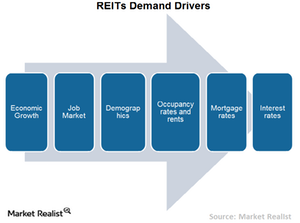What Factors Drive REIT Earnings?
Economic growth is the major factor that determines REITs’ growth. An uptick in economic fundamentals positively affects the REITs by increasing business growth.
Sept. 2 2015, Updated 11:06 a.m. ET

Demand drivers
REITS invest in residential property, offices, warehouses, shopping centers, medical facilities, and hotels. The key demand drivers for revenue generation for these investments are population growth, the rise in economic activities, improvement in the job market, mortgage rates, and commercial and industrial growth, among others. Fluctuations in any of these key drivers will have a direct impact on the demand generation of residential, office, warehouse, and shopping center properties. It will affect REIT earnings.
Economic growth
Economic growth is the major factor that determines REITs’ growth. An uptick in economic fundamentals positively affects all of the REITs like Simon Property Group (SPG) and Ventas (VTR) by increasing business growth.
Job market
The strength of the job market fuels the demand for the housing, office, and hotel industry. Strong job growth can drive higher occupancy rates and lead to a rise in the unit rental revenue. In contrast, high unemployment and slow job growth can result in falling occupancy rates and lower revenue per unit.
Demographics
The rate of population growth in the company’s operating regions is another key determinant of the company’s success. Rising population results in greater demand for apartments, hotels, and warehouses units. In addition, a decision by Millennials to rent or own a house has a lot of implications on REITs’ earnings.
Occupancy rates and rents
Higher occupancy rates and rising rents are the most immediate sources of revenue growth for REITs like Equity Residential (EQR). Higher occupancy rates lead to higher income for REITs and vice versa. As the economy expands, the demand for space increases. This leads to a rise in rents.
Mortgage rates
If mortgage rates are lower, buying a home becomes more attractive than renting. It’s more affordable to buy a house. In such a scenario, the demand for rental properties diminishes. In contrast, if the mortgage rates are higher, renting an apartment becomes more appealing. This leads to a rise in occupancy rates and higher rental revenue.
Interest rates
Rising interest rates can hurt REITs in many ways. When interest rates rise, investors demand a higher dividend yield on REITs. This drives down their stock prices. Another negative effect of rising interest rates on REITs is that they have to incur a higher interest cost to finance building purchases. This puts the margins under pressure.
Investors looking for diversification in the REIT sector can get exposure to REIT ETFs like the Vanguard REIT ETF (VNQ), the iShares U.S. Real Estate ETF (IYR), and the iShares Cohen & Steers REIT ETF (ICF).
